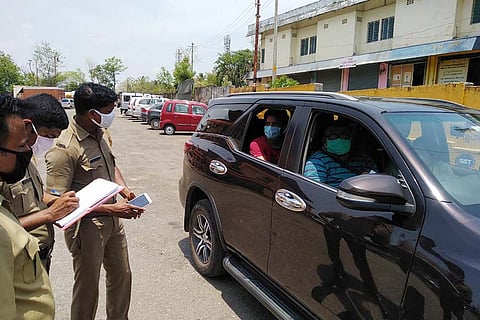Travelling to Kerala from another state or from abroad? What you need to know
After a brief lull of a couple of days with no new people in Kerala being infected by COVID-19, the state is once again seeing a spike in the number of people turning positive for coronavirus, with the influx of inter-state and international passengers.
Of the 16 people reported positive for the virus over the past three days, 11 either came from abroad or are inter-state travellers. This spike comes a day after Chief Minister Pinarayi Vijayan remarked that the state has flattened the COVID-19 curve.
With more and more people expected to come into Kerala from abroad and other states in the coming days, the state can expect the number of cases to increase again. Though this cannot be prevented, Kerala has announced measures to quarantine these travellers.
The Standard Operating Procedures in place has defined a set of rules for inter-district, inter-state and international passengers in Kerala.
Inter-district travel
People in the private sector who are required to make inter-district journeys daily as part of their work can get travel passes by registering in the portal run by Kerala Police or can get passes directly through station house officers of nearby police stations.
But there are no medical screening procedures for inter-district travellers at present. The Chief Minister’s Office confirmed to TNM that such persons only require to take a travel pass and there will be no medical screening.
Inter-state travel
Kerala has opened inter-state borders at six places - Walayar in Palakkad, Manjeshwar in Kasaragod, Muthanga in Wayanad, Kumily in Idukki, Injivila in Thiruvananthapuram and Aryankavu in Kollam. People are allowed to enter the state only if they get e-passes issued by Kerala through the COVID19 Jagratha portal.
At all the six inter-state borders, people are being screened for symptoms before they cross the border. If any passengers are found to have COVID-19 symptoms like cough, cold, fever or breathlessness, they will not be allowed to proceed further. They will be moved to the nearest COVID-19 hospital and tested upon arrival.
If found positive, they will undergo treatment and isolation at the COVID-19 hospital.
However, if they test negative, these travellers will be asked to undergo a mandatory 14-day home quarantine.
All travellers who don’t have any symptoms on arrival will also undergo a mandatory 14-day home quarantine. The Kerala government, which had initially mandated institutional quarantine for all inter-state travellers barring pregnant women, children below 10 years of age and senior citizens, amended its rule to allow home quarantine for all.
Additionally, those who do not have the facilities to undergo home quarantine will be moved to quarantine centres arranged by the government.
The amended rules also state that those who exhibit symptoms during their home quarantine period will undergo an RT-PCR test.
International travel
No international passenger landing in Kerala will be allowed to go home directly. Upon arrival at airports, they will also undergo thermal screening.
Those exhibiting symptoms will be shifted to the designated COVID-19 care hospitals near the airport.
Pregnant women, children below 10 years of age and senior citizens above 75 years found asymptomatic during the airport screening will be allowed to directly go to home quarantine.
All others without symptoms will undergo institutional quarantine in government allotted centres for a minimum of 7 days.
In these institutional quarantine centres, RT-PCR tests will be conducted for everyone on the end of day 7.
Whoever tests negative will be asked to go on home quarantine for another 7 days.
Those who test positive will, however, be shifted to dedicated COVID-19 hospitals for treatment and isolation.
The Chief Minister had announced that these international persons will undergo institutional quarantine in their respective home districts. For example, if a passenger lands at Nedumbassery International airport and is headed to Thrissur, he or she will be transported to Thrissur in an ambulance and then kept in isolation there.
The state government has also arranged for paid quarantine facilities for those who are willing to pay. But even if international passengers opt for paid quarantine facilities in hotels, they must report to the institutional quarantine facility before being transported to the paid facility.
(We at TheNewsMinute need your support. You have always encouraged our journalism and we hope you will continue to do so. Please become a member of TNM and enable us to continue with our work. Click here).
Random testing
The amended rules mention that random samples (pool sampling) of asymptomatic persons with inter-state travel history will be taken. Until the antibody test kits are made available by the Indian Council of Medical Research (ICMR), these random samples will be tested using RT-PCR. Once the antibody test kits are procured, only those who test positive with the antibody kits will be subjected to an RT-PCR test.
The government has also relaxed its testing rules. While earlier those who tested positive for the virus were subjected to follow-up tests with the PCR kits every alternate day from the day of the first result, the new rules suggest testing once every 7 days.
Read:
Watch:

